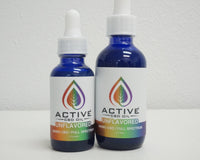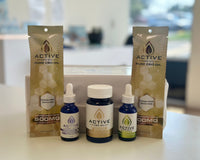As cannabidiol (CBD) rises in popularity so do myths and misconceptions about the cannabinoid. In recent years more and more positive research has come out about the potential health benefits of CBD but many people are misinformed or have misconceptions about CBD. Some of these myths include the idea that CBD is illegal, CBD gets you high, CBD means ‘good’ but THC means ‘bad’, CBD has no side effects, and CBD is a “cure all” for any issue. This blog will explore each of these points and offer an explanation and information about each of these misconceptions.

Is CBD legal?
A common question that people have about CBD is, is CBD truly legal? Many people may hear CBD and associate it as cannabis or confuse it with THC and assume that it is federally illegal. This is not the case as hemp, hemp oil, and hemp derived CBD oil are considered federally legal in all 50 states. The farm bill in 2018 removed hemp from the controlled substances list so therefore it can be cultivated, sold, and used legally as long as the product contains under 0.3% THC. Anything with above 0.3% THC by volume is labeled as medical marijuana and the legality of this varies widely from state to state as it is still considered federally illegal.

Will CBD make me high?
Another frequent assumption made about CBD is that it will give you a psychoactive ‘high’. This is entirely false. CBD is not a psychoactive compound and actually has been shown to counteract some of the psychoactive effects of THC. THC is the cannabinoid that is associated with the “high” effects of cannabis. While CBD can promote calmness and relaxation, THC is what produces euphoric effects and changes perceptions of space and time. Both THC and CBD act on cannabinoid receptors that are found within the brain and body. The reason THC can give you the euphoric “high” feeling is because it activates the cannabinoid receptors while CBD acts as an antagonist for the same receptors, therefore blocking some of the psychoactive effects associated with THC.

Does THC mean something bad?
Since THC is the psychoactive component of cannabis, many people may make the assumption that THC is bad or doesn’t have any potential therapeutic benefits and that CBD is the only ‘good’ part of the plant. This is not true as both THC and CBD have shown numerous potential benefits towards a variety of conditions. Both cannabinoids have potential benefits for helping with a variety of issues including pain, anxiety, and nausea. When used in conjunction it is theorized that THC and CBD as well as other cannabinoids found within the plant all work synergistically together to potentiate the effects of one another. Although, keep in mind that if taken in too large of doses, THC can cause more unwanted side effects such as, anxiety, coordination problems, and memory problems.

Does CBD have any side effects?
With all its many possible benefits, CBD can be a powerful therapeutic compound however, not without any side effects. While CBD is considered to generally be safe from unwanted side effects there are a couple of things you should be aware of if looking to take CBD. There are several pharmaceuticals that may have adverse reactions with CBD including warfarin, amiodarone, levothyroxine, and several different seizure medications. Make sure to consult your physician or a healthcare professional before starting any new supplement to make sure it will not interact or interfere with any current medications you may be taking.

Is CBD a "cure all"?
The final myth that we will be discussing is the idea that CBD is a sort of “cure all” for any type of health issue you may have. While CBD has the potential to help with a variety of different problems including ADD/ADHD, anxiety, epilepsy/seizures, nausea, depression, inflammation, and many more, it is not necessarily going to fix every health problem you may be experiencing. Lots of research has come out and is continually being done about the potential health benefits of the cannabinoid but until further research needs to be completed. Every person’s endocannabinoid system is different so what works for someone may not work for others. Start with a small dose and work your way up to find the optimal dosage for you.


The conclusion
To conclude, hemp derived CBD containing no more than .3% THC is legal in all 50 states. CBD alone won’t give you a psychoactive high, and THC isn’t ‘bad.’ Especially if THC is used in conjunction with CBD as it has been shown to have many possible therapeutic benefits. While CBD is safe most of the time it can interact with a few specific medications so make sure you always speak with your health care provider before taking CBD. If you are looking to try CBD visit Discover CBD in store at one of our five locations or online at discovercbd.com.


























